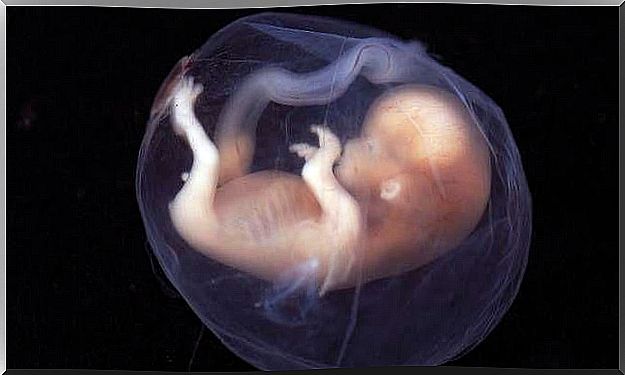Thyroid And Pregnancy, What Is Their Connection?

The thyroid and pregnancy have a direct relationship that not everyone knows. During gestation, the mother’s thyroid gland is “forced” to increase its production of thyroxine by 30 to 50%. Its balance and proper functioning will promote good brain development of the fetus as well as that of its nervous system during the first trimester.
Sometimes the way our glands and hormones affect our well-being can fascinate or terrify us. Often a tiny imbalance between them can make us realize that something is wrong. We gain or lose weight, we feel more tired, or even worse, we may have some difficulty when we want to conceive a child.
Irregularities in menstruation, fertility and the proper development of a pregnancy depend on this tiny butterfly-shaped organ located just below the Adam’s apple. With only 30 grams this small plant increases the hormones triiodothyronine (T3) and thyroxine (T4) which have a very big impact on our health and especially on the good development of the baby during the first months of gestation in the womb of his mother.

Thyroid and pregnancy, the importance of a fundamental exchange between mother and child
The thyroid gland develops in the fetus between the 10th and 12th week of pregnancy. Until then, the fetus will then depend exclusively on the thyroid gland of its mother. It is therefore of immense importance. If a woman has a clinical history characterized by a thyroid disorder, such as hypothyroidism, several things can happen.
The first consequence is that the woman may have difficulty conceiving; but that doesn’t mean she can never get pregnant. The risk of miscarriage is also present, as well as that of premature births or other medical problems such as preeclampsia (high blood pressure during pregnancy). Thyroid and pregnancy are two words that every woman should have in mind if she wants a child. It is therefore always recommended to perform an analytical thyroid profile in order to diagnose any problems, any dysfunction that may cause major problems in the short or long term.
Hormonal changes during pregnancy
A normal pregnancy presupposes a direct impairment of thyroid function. This is due to the influence of two very concrete hormones: the human chorionic hormone gonadotropin (hCG) which is measured in the pregnancy test, and estrogen which is the main female hormone.
The human chorionic hormone gonadotropin acts as a stimulant for the thyroid. This change in a woman’s body begins 2-3 days after conception and lasts about three months. Some mothers notice this change more pronounced (also known as false hyperthyroidism) to the point of experiencing more than normal vomiting, palpitations and also weight loss.

After reaching the second half of the year, other effects appear and they also help to modify thyroid function. In this case, the culprits are the female hormones (estrogen). Thus, between weeks 16 and 20, the level of the protein responsible for fixing thyroxine in the blood doubles (TBG). This alteration is known as false hypothyroidism, but if clinical tests show that free T4 (thyroxine) has not changed, then there is no problem.
Symptoms of hypothyroidism in pregnancy
Since the thyroid and pregnancy have such an obvious relationship, it is common to periodically monitor the mother’s thyroid profile throughout pregnancy. Thus, if insufficient production of thyroxine is detected, then a diagnosis of hypothyroidism will be given. It should be noted that this assignment is easy to deal with. These symptoms are:
- Fragile and brittle nails and hair
- Tired
- Abnormal weight gain
- Continuous feeling of cold
- Muscle and joint pain
- Dry skin
- Digestive issues
Also, as we pointed out at the beginning, the appearance of a thyroid problem during pregnancy increases the risk of miscarriage and premature birth.
Symptoms of hyperthyroidism during pregnancy
The development of hyperthyroidism during gestation is a relatively rare disorder. Population studies tell us that the incidence of this disorder is 2 in 1,000 women. The symptoms are as follows:
- Weightloss
- Intestinal problems
- Low heat tolerance
- Lack of motivation and bad mood
- Tremors
- Insomnia
- Appearance of goiter (swollen neck)
- Preeclampsia: hypertension and fluid retention
If a mother has hyperthyroidism during management and does not receive treatment, there is a significant risk of fetal death.

Thyroids and pregnancy: importance of prevention
The relationship between thyroids and pregnancy should not scare us as long as we carry out adequate medical monitoring. These disorders of the thyroid gland are curable and have a good prognosis for both mother and child. When we have a family history associated with this disease and we want a child, it is recommended to discuss this information with specialists.
Adequate supervision based on periodic checks added to an adapted diet and healthy lifestyle habits will undoubtedly allow us to live a more serene pregnancy.










